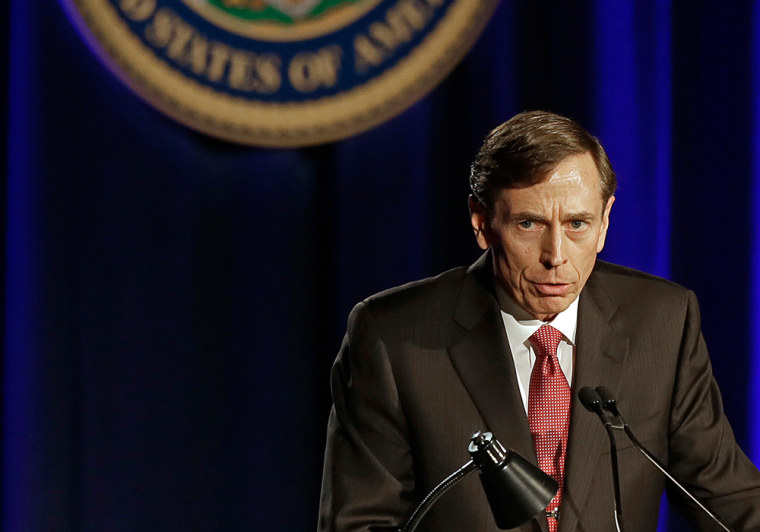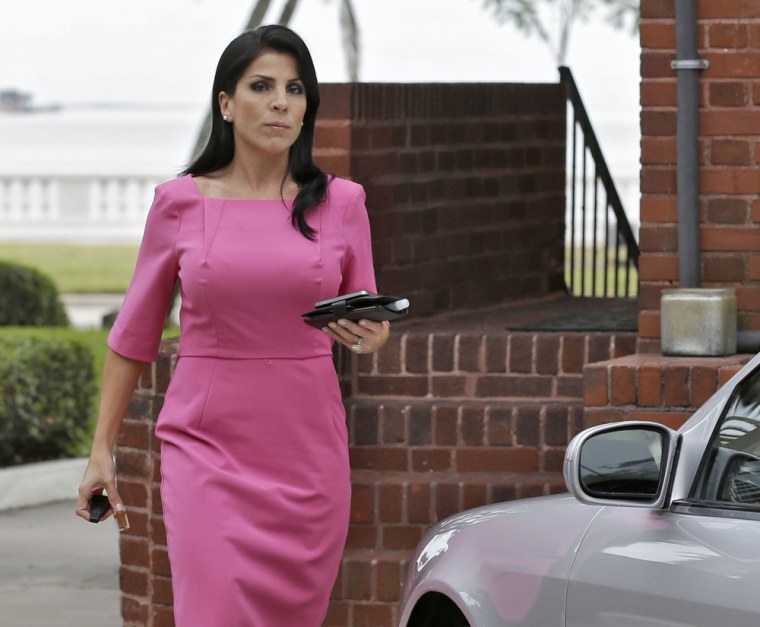
A veteran FBI counterterrorism agent repeatedly raised concerns last year that senior bureau officials were stalling an investigation into then-CIA Director David Petraeus’ extramarital affair to avoid a distraction prior to the 2012 presidential election, according to a former FBI official and two sources with direct knowledge of the agent’s account.
New details about the claims of Fred Humphries, a 17-year FBI veteran who is assigned to the bureau’s Tampa office, are expected to be included in a legal filing soon by Jill Kelley, a Tampa Bay socialite who became embroiled in the Petraeus investigation. NBC News independently learned how Humphries raised concerns about possible interference in the investigation with a former senior bureau official and Republican lawmakers, arguing that it could pose a potential national security risk.
Kelley, who had close social connections to a wide array of senior U.S. military and intelligence officials, many of whom she met at parties she threw at her home, is suing current and former Obama administration officials for allegedly leaking her name and smearing her reputation after the case became public. Kelley’s lawsuit threatens to force a re-examination of the details of Petraeus’ resignation and to require a number of key players — including former Defense Secretary Leon Panetta, Deputy FBI Director Sean Joyce (who announced his resignation this week), Homeland Security Secretary nominee Jeh Johnson and many others — to answer questions under oath.
Petraeus resigned as CIA director one year ago this week after an FBI “cyberstalking” investigation into harassing emails sent to Kelley uncovered a sexual relationship between the CIA director and his biographer, Paula Broadwell.
Humphries’ claims about high-level interference from FBI headquarters were raised in multiple conversations last year with his former boss, Charles Mandigo, a former special agent in charge of the FBI’s Seattle office, where Humphries had previously been assigned. Mandigo then helped arrange for Humphries to raise his concerns with two Republican members of Congress, including House Majority Leader Rep. Eric Cantor, R-Va.
Humphries “said at one point, he had been told, just sit back and wait. Once the election is over, this will be quietly handled and it will all be resolved,” Mandigo said. Humphries attributed the comment to an unidentified senior official in the FBI’s Tampa office, he said.

Among the claims in Kelley’s lawsuit, which relies in part on Humphries’ account, is that Joyce, the deputy FBI director, assumed control of the investigation, preempted decisions made by Tampa agents assigned to the case and, at one point, directed them to delay a scheduled interview with Broadwell. The suit alleges that the case was handled “differently than normal criminal investigations” because bureau officials “wanted to avoid attention before the upcoming presidential election cycle.”
An FBI spokesman declined comment, citing “pending litigation.” The Justice Department has filed a motion to dismiss the lawsuit, asserting that she does not have grounds to bring the complaint under the Privacy Act.
Humphries, who has been portrayed in some media reports as a whistleblower -- although he was never specifically assigned to the Petraeus case -- was informed last summer that he is the subject of a misconduct probe by the FBI’s Office of Professional Responsibility for the “unauthorized disclosure” of law enforcement information relating to the investigation, according to a source with direct knowledge of the matter.
Reached on his cellphone this week, Humphries declined to discuss details but said his decision to raise his concerns outside of bureau channels “was the right thing to do – even if it was unpleasant. If it happened again, I would do the same thing. Nobody is above the law, nobody is below it.”
The investigation of Petraeus began in early June 2012 after Kelley and her husband stated receiving what they viewed as harassing and threatening emails from an anonymous correspondent – with the addresses “Kelley patrol” and “Tampa Angel.” The emailer appeared to know precise details about the private schedules of Petraeus and senior generals at the U.S. Central Command, including an upcoming dinner that Kelley had planned with the CIA director. The emails suggested the movements of senior U.S. officials as well as Kelley were “clearly being tracked by someone with a hostile fixation,” according to the lawsuit filed by Kelley and her husband, Sean Kelley, a doctor.
One email concluded with threats about “averting… embarrassment for all, including spouses, such as info in national headlines,” according to the Kelley complaint, which was filed in federal court in Washington, D.C., in June.
Kelley first reported these emails to Humphries, a personal friend, who in turn passed them along to agents in Tampa who launched a “cyberstalking” investigation. Although Humphries was not assigned to the investigation, he stayed in touch with Kelley and monitored developments in the probe.
Humphries has alleged that in July 2012, he was called into the offices of Steve Ibison, then the special agent in charge of the Tampa office, and told that the “senior leadership of the FBI was convinced” he was having sexual relations with Kelley, according to a source directly familiar with his account. Humphries denied the charges -- as has Kelley -- and offered to take a polygraph, but that offer was not accepted, the source said. (An FBI spokesman in Tampa declined comment.)
Shortly thereafter, Humphries reached out to Mandigo, his former boss and expressed concern that he was being made a “scapegoat” in a politically toxic investigation.
“What troubled me is somebody was clearly going out their way to discredit the guy,” Mandigo said. “They were engaging in character assassination.”
Mandigo, who had previously served as a FBI spokesman in Washington, praised Humphries as a “great agent” who played a leading role in major counterterrorism cases, including the investigation into the so-called “millennium bomber” Ahmed Ressam, an al Qaeda operative who tried to blow up Los Angeles International Airport in December 1999. But Humphries, according to Mandigo, was also known as a maverick who sometimes ran afoul of FBI headquarters, including writing memos questioning aggressive interrogation techniques while serving as a deputy FBI commander at the U.S. detention facility in Guantanamo.
Mandigo said he became especially concerned when he learned from Humphries that FBI agents had traced the harassing emails to Broadwell, Petraeus’ biographer. Mandigo said he and Humphries believed there were “national security concerns” that demanded that the investigation be aggressively pursued and concluded.
“Consider the possibility that one or both of them (Petraeus and Broadwell) could have been compromised,” Mandigo said. “If that happened, how could they rationalize how they handled this?”
After several conversations, Mandigo helped arrange for Humphries to raise his concerns with Republican Rep. Dave Reichert, who represented the Seattle area, and then with Cantor during the week before last year’s election.
According to accounts provided by U.S. law enforcement and congressional officials last year, Cantor, alerted by Reichert, called Humphries on Oct. 27. Steve Sombres, the majority leader’s chief of staff, then called then FBI Director Bob Mueller’s chief of staff on Oct. 31 to inquire about the Petraeus probe.
In the days that followed, FBI agents completed their second interviews with Petraeus and Broadwell. At 5 p.m. on Tuesday, Nov. 6 -- Election Day -- Director of National Intelligence James Clapper was informed by the FBI of the investigation and that the CIA director had acknowledged a sexual relationship with Broadwell. That Friday, Nov. 9, Petraeus resigned.
The Kelley lawsuit is focused on her treatment during the investigation, alleging agents violated her privacy by demanding “unrestricted access” to her private emails and, along with senior Defense Department officials, later leaked information about them — suggesting she was having an inappropriate relationship with Gen. John Allen, then the U.S. commander in Afghanistan.
Her complaint also describes a scene in the driveway of her Tampa home on July 17, 2012 in which, she alleges, FBI agents confronted her while her three children were in her house and demanded she get in a SUV for questioning. When she balked, “the agents threatened her, demanding that she not make them do something in front of her children that may terrify them.” After she got in the SUV, the complaint states, agents “demanded she answer bewildering questions regarding her relationship with Director Petraeus and General Allen — including insinuations and accusations that she was engaged in adulterous activity.”
During the height of the furor over the case, Humphries was reported to have sent a "shirtless" photo to Kelley. But Mandigo noted that he and many others had gotten a copy of the same "joke" photo years earlier. It showed Humphries next to two mannequins at a shooting range. Humphries was known for sending such photos, he said, adding, "That's just Fred."
More from NBC News Investigations: